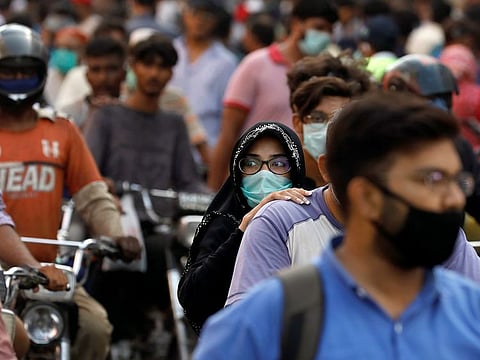Why weddings have become a headache in Pakistan
Government set to slap ban on marriage halls and marquees due to spike in Covid infections

While not exactly in a state of national emergency, but Pakistan does look to be inking deeper and deeper into the ever-thickening morass of COVID-19. Shutdown boards are appearing on pretty much everything that can cause mass gatherings.
The wedding industry is the hardest hit. The marquees around the country have been marked as super spreaders and starting this week, wedding functions will be totally banned.
There is defiance to the official order since the financial interests of many a sub-industry (jewellery, clothes, food, beauty parlours and catering for instance) are closely tied to the business.
Many have tried to operate in an underhand manner but considering how difficult it is to keep under wraps hundreds of people gathered to celebrate a happy occasion, the attempts have been repeatedly foiled by the local administration.
Also Read: Why Pakistan is reopening its schools now
Also Read: How COVID-19 upended Pakistan Super League
Last year some raids led to brawls and arrests — not just of the owners of the business but the wedding parties members as well who had planned their events long before the ban was even on the cards and were insistent on going ahead with the plan.
Moreover, it is also the wedding season in the country. Usually, the spring sets off an avalanche of weddings as bookings soar and there is a mad rush to make use of the temperate temperatures before the sizzling hot season sets in.
Typically, much of the schedule of the weddings is decided months earlier and all the logistics are sorted out keeping in mind everyone’s convenience.
Complete disruption in plans
This year’s wedding schedules that now face total disruptions or at least painful and expensive readjustments, should have been informed by the last year’s experience when around the same time the pandemic spread thick and fast.
However, that did not seem to have happened, for a reason no less than the fact that about four weeks ago COVID-19 wasn’t even officially acknowledged to be a threat to reckon with. The public must have assumed that this wave too shall pass without much ado -- clearly a wrong premise to decide the time for taking the matrimonial vows.
The recourse left after such cancellations are indoor weddings, which used to be the norm before the marquees and wedding hall business became fashionable.
That, however, requires some deft handling since the local administrations in key cities of Pakistan has become hawk-eyed about all types of larger social intermingling, regardless of whether these are inside homes or in the rented halls.
Moreover, the supply chain that helps accomplish the task of holding a wedding is either partly functional or is also hit by restrictions and bans. From dolling up for the party to laying out the food spread, every step of the way is now under threat from the proposed coronavirus ban.
Logistics is another issue. Provincial governments are seriously considering putting intra-provincial, and, in some instances, intracity transport ban to ensure that travel does not expand the activity theatre of the virus. That adds another problematic dimension to the tricky equation.
Most wedding parties travel long distances to meet up for the final event. If wheels are under the threat of being jammed by bans, no such plan can be even considered much implemented. Some families travel from abroad to partake the joys of such gatherings. Even that has now become a reduced effort.
At any rate travel generally has been under the pall of COVID-19 for quite some time. Statistics show that ravelling aboard during seven months of 2020-21 was worth around $454 million. Travelling aboard during the same period last year was $902 million. This is an almost 50 per cent decline.
Pilgrimage travel has also suffered steep fall: only $261,000 worth of travelling was accounted as compared to corresponding period last year when it was $269 million.
Now internal travel too is getting restricted and with COVID surging even those brave-hearts who would generally disregard official warnings and take to the roads (or the airports) will have to cool their heels for a while.
This confronts the wedding walas with stark and unpleasant choices: either postpone and pend their nuptial dreams and bliss to the days when national life is less hectic and challenged or simplify the whole event to its bare bones.
This means no fanfare, no extended families’ endless meetings and no parties. And those who don’t want to do either will most likely go to the third option -- move everything as planned, disregarding the pandemic and dodging the local administration.
That would obviously make holding a wedding and getting wedded a slippery proposition. But then we know people have risked kingdoms to be with their chosen ones; battling a ban in Pakistan might look like a minor adventure.
Syed Talat Hussain is a prominent Pakistani journalist and writer. Twitter: @TalatHussain12








